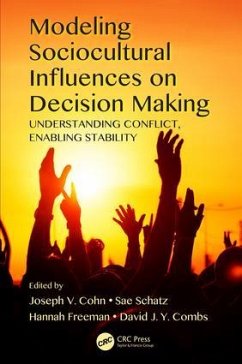Modeling Sociocultural Influences on Decision Making
Understanding Conflict, Enabling Stability
Herausgeber: Cohn, Joseph V; Combs, David J Y; Freeman, Hannah; Schatz, Sae
Modeling Sociocultural Influences on Decision Making
Understanding Conflict, Enabling Stability
Herausgeber: Cohn, Joseph V; Combs, David J Y; Freeman, Hannah; Schatz, Sae
- Gebundenes Buch
- Merkliste
- Auf die Merkliste
- Bewerten Bewerten
- Teilen
- Produkt teilen
- Produkterinnerung
- Produkterinnerung
Cross Cultural Decision Making seeks to understand the impact that a variety of influences including geographical, historical, sociological, organizational, team, and technology have on an individual's decision making processes. This book proposes to explore how advances in information and social media technologies, as well as modeling and simulation tools, can be leveraged to represent and characterize a culture's decision making processes, providing an alternative means for gaining a shared cultural understanding in today's hi-tech and globally interconnected world.
![Decision Making in Complex Environments Decision Making in Complex Environments]() Jan NoyesDecision Making in Complex Environments215,99 €
Jan NoyesDecision Making in Complex Environments215,99 €![Decision-Making in High Risk Organizations Under Stress Conditions Decision-Making in High Risk Organizations Under Stress Conditions]() Anthony J SpurginDecision-Making in High Risk Organizations Under Stress Conditions123,99 €
Anthony J SpurginDecision-Making in High Risk Organizations Under Stress Conditions123,99 €![Advances in Cross-Cultural Decision Making Advances in Cross-Cultural Decision Making]() Advances in Cross-Cultural Decision Making268,99 €
Advances in Cross-Cultural Decision Making268,99 €![Advances in Ergonomics Modeling and Usability Evaluation Advances in Ergonomics Modeling and Usability Evaluation]() Advances in Ergonomics Modeling and Usability Evaluation268,99 €
Advances in Ergonomics Modeling and Usability Evaluation268,99 €![Human Computer Interaction Handbook Human Computer Interaction Handbook]() Human Computer Interaction Handbook309,99 €
Human Computer Interaction Handbook309,99 €![Delivering Resilient Health Care Delivering Resilient Health Care]() Delivering Resilient Health Care183,99 €
Delivering Resilient Health Care183,99 €![Safety Analysis Safety Analysis]() Lars Harms-RingdahlSafety Analysis234,99 €
Lars Harms-RingdahlSafety Analysis234,99 €-
-
-
- Produktdetails
- Verlag: Taylor & Francis
- Seitenzahl: 576
- Erscheinungstermin: 27. September 2016
- Englisch
- Abmessung: 254mm x 185mm x 38mm
- Gewicht: 1157g
- ISBN-13: 9781498736695
- ISBN-10: 1498736696
- Artikelnr.: 45751415
- Verlag: Taylor & Francis
- Seitenzahl: 576
- Erscheinungstermin: 27. September 2016
- Englisch
- Abmessung: 254mm x 185mm x 38mm
- Gewicht: 1157g
- ISBN-13: 9781498736695
- ISBN-10: 1498736696
- Artikelnr.: 45751415
Section I Building Theories
Expeditionary Modeling for Megacities and Other Dense Urban Areas
More than Just a Story: Narrative Insights into Comprehension, Ideology, and Decision Making
The Spread of Information via Social Media
The Spread of Opinions in Societies
Culture's Influences on Cognitive Reflection
Cultural Influences on Cognitive Biases in Judgment and Decision Making: On the Need for New Theory and Models for Accidents and Safety
Section II Collecting and Analyzing Data
The Sixty Percent Mission: An Introduction to High-Risk Ethnography Process and Protocol in Support of the US Army's Civil Affairs Humanitarian Mission
Challenges in Connecting with the Disconnected: An Introduction to Connecting with Communities Disconnected from the Rest of the World
They Are Beyond WEIRD: Helpful Frameworks for Conducting Non-WEIRD Research
Deciphering the Emic Perspective in Data in Order to Assess Threat
Collecting Data and Semantic Content via Mobile Devices
Measuring Changes in Attitudes: Using Factor Analysis to Track Population Attitudes Spatially and Temporally
Gaining Insight by Applying Geographical Modeling
Section III Building and Validating Sociocultural Models
Sociocultural Capability Requirements across All Phases of Military Operations
Methods to Characterize and Manage Uncertainty for Sociocultural Applications
Validating Causal and Predictive Claims in Sociocultural Models
Rapid Generation of Political Conflict Simulations for Scenarios around the World
Detailed Model Development Case Study: The Peace Game
Section IV Applying Sociocultural Models to Gain Insight into Conflict and Instability
Using the Social Framework Model of Trust to Better Understand Trust in Government
Understanding Public Opinion toward Violent Extremists
Modeling Sociocultural Influences on Decision Making: Assessing Conflict and Stability
Modeling Social System Resiliency: An Agent-Based Multiscale Approach
Applying Modeling and Simulation to Foreign Policy: An Afghan Example
Subject Index
Author Index
Section I Building Theories
Expeditionary Modeling for Megacities and Other Dense Urban Areas
More than Just a Story: Narrative Insights into Comprehension, Ideology, and Decision Making
The Spread of Information via Social Media
The Spread of Opinions in Societies
Culture's Influences on Cognitive Reflection
Cultural Influences on Cognitive Biases in Judgment and Decision Making: On the Need for New Theory and Models for Accidents and Safety
Section II Collecting and Analyzing Data
The Sixty Percent Mission: An Introduction to High-Risk Ethnography Process and Protocol in Support of the US Army's Civil Affairs Humanitarian Mission
Challenges in Connecting with the Disconnected: An Introduction to Connecting with Communities Disconnected from the Rest of the World
They Are Beyond WEIRD: Helpful Frameworks for Conducting Non-WEIRD Research
Deciphering the Emic Perspective in Data in Order to Assess Threat
Collecting Data and Semantic Content via Mobile Devices
Measuring Changes in Attitudes: Using Factor Analysis to Track Population Attitudes Spatially and Temporally
Gaining Insight by Applying Geographical Modeling
Section III Building and Validating Sociocultural Models
Sociocultural Capability Requirements across All Phases of Military Operations
Methods to Characterize and Manage Uncertainty for Sociocultural Applications
Validating Causal and Predictive Claims in Sociocultural Models
Rapid Generation of Political Conflict Simulations for Scenarios around the World
Detailed Model Development Case Study: The Peace Game
Section IV Applying Sociocultural Models to Gain Insight into Conflict and Instability
Using the Social Framework Model of Trust to Better Understand Trust in Government
Understanding Public Opinion toward Violent Extremists
Modeling Sociocultural Influences on Decision Making: Assessing Conflict and Stability
Modeling Social System Resiliency: An Agent-Based Multiscale Approach
Applying Modeling and Simulation to Foreign Policy: An Afghan Example
Subject Index
Author Index








